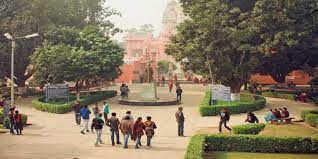Three colleges from district fill over 1,000 seats in TNEA
Kenfra Research2023-09-06T15:15:30+05:30Three colleges from district fill over 1,000 seats in TNEA.
The colleges in a district to fill over 1,000 seats through admissions, especially in larger districts or regions with a high demand for education. The number of seats filled depends on factors such as the popularity of the colleges, the courses offered, and the quality of education provided. In Tamil Nadu, the Tamil Nadu Engineering Admissions (TNEA) process is used to admit students into engineering colleges. If three colleges in a district have collectively filled over 1,000 seats through TNEA, it signifies that these colleges are likely popular choices among students for engineering education.
Quality Education: The fact that these colleges are able to fill such a large number of seats indicates that they likely offer quality education and have a good reputation among students and parents.
Infrastructure and Facilities: To accommodate a large number of students, it’s important for these colleges to have adequate infrastructure, including classrooms, laboratories, libraries, and other facilities.
Faculty: High-quality faculty members are essential for providing a good education. Colleges should ensure that they have a sufficient number of well-qualified professors and instructors.
Diversity: Filling a large number of seats can also indicate that these colleges attract students from various backgrounds and regions, promoting diversity and cultural exchange on campus.
Employment Opportunities: The colleges should also focus on providing students with opportunities for internships, projects, and placements to enhance their employability.

6. Continuous Improvement: To maintain and further improve their position, these colleges should engage in continuous quality improvement efforts, including curriculum updates and faculty development programs.
7. Support Services: It’s important for colleges to offer support services to help students succeed academically and personally. This includes counseling, career guidance, and extracurricular activities.
8. Community Engagement: Engaging with the local community can be beneficial for colleges. They can collaborate on research projects, community service initiatives, and outreach programs.
9. Accreditation: Seek accreditation from recognized bodies to ensure that the education provided is in line with established standards.
10. Transparency: Maintain transparency in the admission process and ensure that it is fair and merit-based.
11. Feedback Mechanism: Establish a mechanism for collecting feedback from students and alumni to identify areas for improvement.
12. Capacity Building: As the number of seats filled increases, colleges should plan for capacity building to maintain the quality of education and infrastructure.
Three colleges from district fill over 1,000 seats in TNEA

Factors that contribute to colleges filling over 1,000 seats include:
- Reputation: Well-known colleges tend to attract more applicants.
- Course Offerings: Colleges that offer a wide range of engineering courses can admit more students.
- Infrastructure: Adequate facilities, laboratories, and faculty can accommodate a higher number of students.
- Location: Proximity to major cities or industrial hubs can make colleges more desirable.
- Affiliation: Being affiliated with a reputed university or institute can increase demand.
To provide quality education:
It’s important for these colleges to maintain their standards and continue providing quality education to their students. Additionally, they should adapt to the changing needs of the industry and job market to ensure that their graduates remain competitive in the workforce.
Moreover, such successful colleges can also consider community engagement and social responsibility initiatives to give back to the local community and contribute to the overall development of the district. This can further enhance their reputation and impact. Overall, the achievement of filling over 1,000 seats in TNEA reflects positively on these colleges and their commitment to education and student success.









Leave a Reply